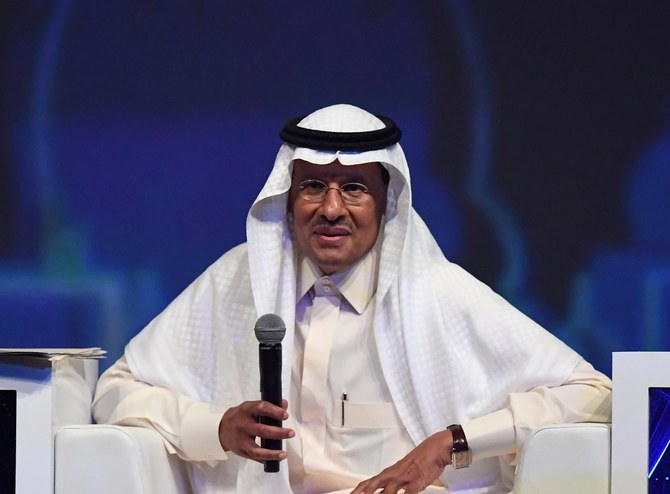MOSCOW: Saudi Energy Minister Prince Abdul Aziz bin Salman has paid tribute to the Kingdom’s ability to “rise to the challenge” in the aftermath of the recent attacks on Aramco oil facilities.
Speaking at the Russian Energy Week forum in Moscow, the minister thanked all those who had helped in the recovery mission after the Sept. 14 strikes on the Abqaiq processing plant and Khurais oilfield, in the Eastern Province.
During his address to delegates at the global oil industry gathering, the prince said: “I’m quite comfortable, and quite honored, to believe that I could stand here with a straight face and ask any of my colleagues here, present or who hear me, where in the world would you have a country, a people and a nation who could overcome that challenge, which has never been seen anywhere in the world?
سمو #وزير_الطاقة : أشعر بالارتياح والفخر الشديدين لاعتقادي بأنني يمكنني أن أقف هنا، وأسأل أيًّا من الزملاء، عن أي دولة وأمة وشعب في العالم بأسره، يمكنه التغلب على مثل هذا التحدي الذي لم يشهد أي مكان آخر في العالم مثيلاً له؟#REW #REW2019 pic.twitter.com/P6gmXHkxpD
— وزارة الطاقة (@MoEnergy_Saudi) October 3, 2019
“When you lose half of your production capacity, when you lose 5 percent of the world’s oil supply, and more important, when the attempt is to make you lose your reputation as a reliable, secure, dependable oil supplier.
“In 72 hours, we first of all regained our capabilities, and retained our reputation, and more or less we assumed our responsibility to attend to our major job, which specifically was to continue to be the most reliable, secure, dependable oil supplier,” he added.
“With a straight face we come to everybody and say if you believe us, that’s fine. If you don’t believe us, you’re more than welcome to come and visit. We have hosted a number of journalists who have visited. We were in the phase of inviting analysts to come to look at our numbers with regard to Aramco, and we will welcome any dignitaries that are here today,” he told a packed plenary session on the theme “maintaining energy connectivity in an unstable world.”
Prince Abdul Aziz also joked that, as the attack had come in his first week as energy minister, he “thought it was a bit of a drill to show me whether I was still up to the job.”
He expressed his gratitude to Crown Prince Mohammed bin Salman, executives and workers at Aramco, and “the entire nation” for their response to the drone and missile strikes.
The minister also thanked his Russian partners — represented on the Moscow stage by the country’s energy minister, Alexander Novak — for their support after the attacks, and revealed that on the first day after the introduction of the Kingdom’s new tourist visa arrangements, some 400 Russians had applied to visit Saudi Arabia, one of the highest number of any nationality.
Later, the prince gave some hard facts to illustrate the Kingdom’s recovery from the strikes. The country had stabilized production capacity at 11.3 million barrels per day (bpd) and made an “additional commitment” to volunteer to keep production lower than the 10.3 million bpd agreed under the Opec+ agreement on oil supply. “We still have the kit and the tools to overcome any future challenges to the Opec+ deal.”
He said the Kingdom should now move on from the attacks to deal with the forthcoming initial public offering (IPO) of Saudi Aramco, which he wanted to make “the most successful IPO ever.”
Prince Abdul Aziz also prioritized the Kingdom’s energy mix between fossil fuels and renewables and further energy price reforms. “We’re looking at the entire ecosystem of energy. We’ve moved on from the attacks, we’ve flipped the page and we’re looking at new challenges.”
He admitted that there were “recessionary forces” at work in the global economy that could affect demand for oil, but said that most of the problems, similar to Brexit and trade wars, were surmountable. “Human beings made the problems so I hope humans can repair them. It needs serious people to attend to them,” the minister added.
















